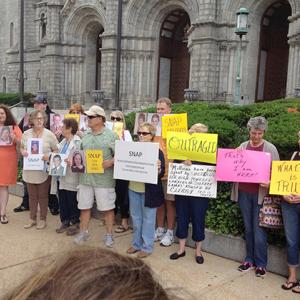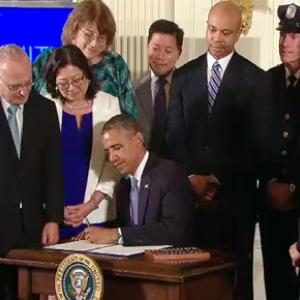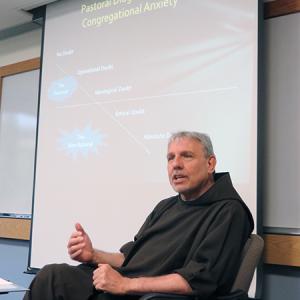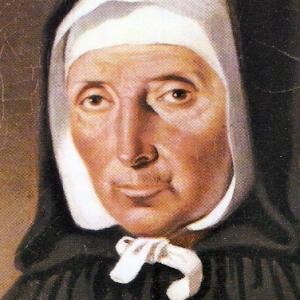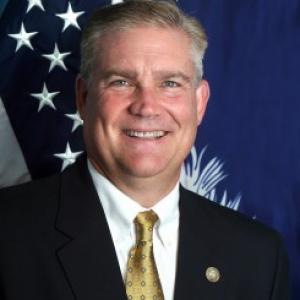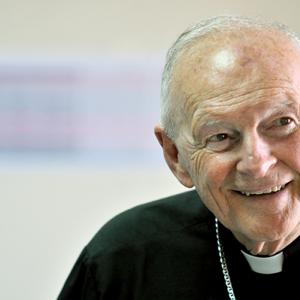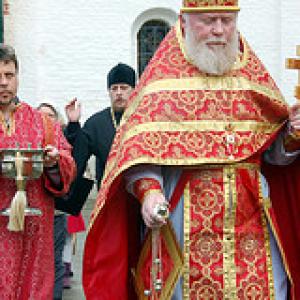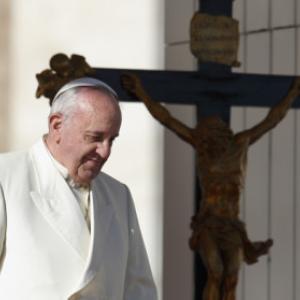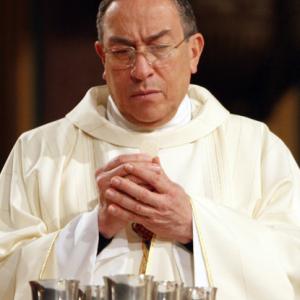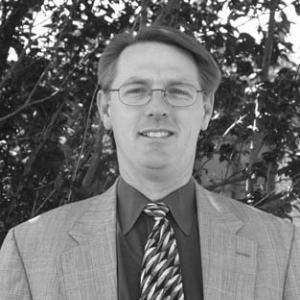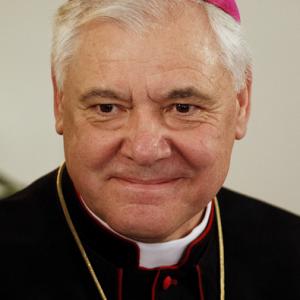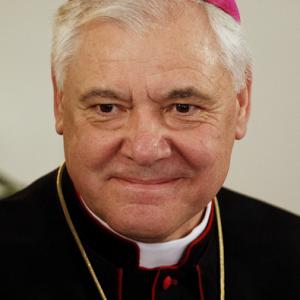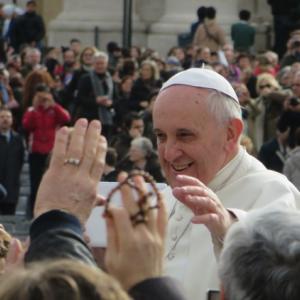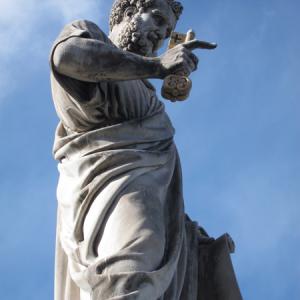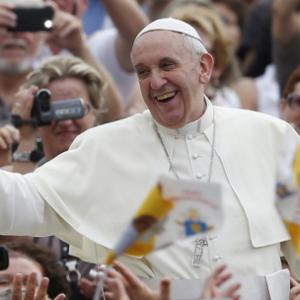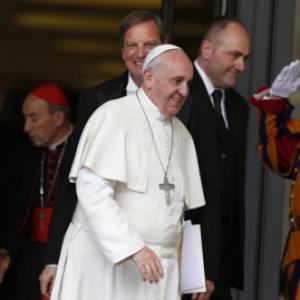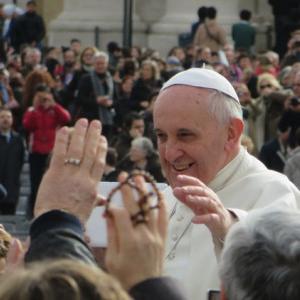David Gibson is an award-winning religion journalist, author, filmmaker, and a convert to Catholicism. He came by all those vocations by accident, or Providence, during a longer-than-expected sojourn in Rome in the 1980s.
Gibson began his journalistic career as a walk-on sports editor and columnist at The International Courier, a tiny daily in Rome serving Italy's English-language community. He then found work as a newscaster across the Tiber at Vatican Radio, an entity he sees as a cross between NPR and Armed Forces Radio for the pope. The Jesuits who ran the radio were charitable enough to hire Gibson even though he had no radio background, could not pronounce the name "Karol Wojtyla" (go ahead -- try it) and wasn't Catholic --- at the time.
When Gibson returned to the United States in 1990 he returned to print journalism to cover the religion beat in his native New Jersey for two dailies and to write for leading magazines and newspapers in the New York area. Among other journalism prizes, Gibson has won the Templeton Religion Reporter of the Year Award, the top honor for journalists covering religion in the secular press, and has twice won the top prize writing on religion from the American Academy of Religion.
Gibson currently writes for Religion News Service and until recently was covering the religion beat for AOL's Politics Daily. He blogs at Commonweal magazine, and has written two books on Catholic topics, the latest a biography of Pope Benedict XVI. He would like to write another -- but can’t seem to find the time.
He has co-written documentaries on early Christian and Jewish history for CNN, and recently worked on a March 2011 History Channel special on the Vatican. He currently has several other film projects in development. Gibson has written for leading newspapers and magazines, including The New York Times, Newsweek, The Wall Street Journal, New York magazine, Boston magazine, Fortune, Commonweal, America and, yes, The Ladies Home Journal.
Gibson is a longtime member of the Religion Newswriters Association. He and his wife and daughter live in Brooklyn.
Posts By This Author
SNAP's Clergy Abuse Victims Mark 25 Years and Eye New Targets
When victims of sexual abuse by Catholic priests first organized into a small band of volunteer activists in the late 1980s, reports of clergy molesting children were still new and relatively few. Most were minimized as anomalies or dismissed altogether — much the way the victims were.
But today, as the Survivors Network of those Abused by Priests, or SNAP, marks its 25th anniversary at a conference in Chicago, its members can take satisfaction in seeing that its claims have been validated, and a few (though hardly all) of its recommendations have been implemented by the church hierarchy.
And instead of facing constant verbal attacks and the occasional angry parishioner spitting on them at a protest, SNAP’s members today are far more likely to receive a handshake and a word of thanks, and maybe even a donation.
SNAP’s advocacy on the Catholic scandal also helped push the reality of sexual abuse into the public consciousness to the point that victims can regularly win in courts and get a hearing in the media, and they are much more likely to come forward to tell their stories, whether they were abused by clergy or by athletic coaches or Boy Scout leaders.
Yet that success is also presenting SNAP with a daunting new challenge as it looks to the future: how to respond to a flood of new inquiries from victims from other faiths and institutions, and how to push for changes beyond the familiar precincts of the Catholic Church.
Did Obama Finally Thread the Needle on Gay Rights and Religious Freedom?
One of the toughest political calculations in Washington is balancing competing claims of gay rights with the traditional prerogatives of religious freedom. After a number of setbacks on that front, President Obama may have finally found a small patch of middle ground with Monday’s move to bar federal contractors from discriminating on the basis of sexual orientation.
Yet Monday’s action also leaves in place a 2002 order signed by President George W. Bush that gives religious groups with federal contracts some leeway by allowing them to use religious beliefs as a criterion in making hiring and firing decisions; as a candidate in 2008 Obama pledged to overturn that exemption.
At the same time, Obama did not expand the exemption to explicitly allow religious groups that receive federal funds to use sexual orientation as grounds for hiring and firing, as some demanded.
Not Just Theology: Catholic Seminarians Go to Summer School to Learn Management Skills
“How many of you have ever studied a parish budget?” the Rev. David Couturier asked the 11 Catholic priests-in-training seated before him. After a few beats, just one hand went up, tentatively.
It’s also why these seminarians were in a classroom at Villanova University in the leafy Philadelphia suburbs, part of a first-of-its-kind program that aims to provide some real-world grounding to the theological studies that dominate their course work.
It’s a bit of “operative theology” to complement the “abstract theology,” as Couturier put it.
Report: Minnesota Archbishop Nienstedt Under Scrutiny for Same-sex Relationships
A Roman Catholic archbishop in Minnesota who had been one of the hierarchy’s most vocal opponents of gay rights is the target of an investigation into allegations that he had a series of sexual relationships with priests, seminarians, and other men.
The investigation of Twin Cities Archbishop John Nienstedt is being conducted by a prominent Minneapolis law firm hired by the archdiocese after church officials received an allegation against Nienstedt.
The archdiocese confirmed the investigation, which was first reported by Commonweal, a Catholic magazine based in New York.
ANALYSIS: Hobby Lobby Beat the Contraception Mandate. Here's Why the Nuns May Not
When the Supreme Court on Monday issued a split decision narrowly backing the right of for-profit corporations to deny contraception coverage to their employees for religious reasons, many assumed that faith-based nonprofits would have it easy when their own cases eventually reach the high court.
“The death knell is sounding for the HHS mandate,” said Lori Windham, an attorney at the Becket Fund for Religious Liberty, which is representing the Little Sisters of the Poor, an order of nuns, as well as other religious groups that object to the Health and Human Services Department policy requiring birth control coverage.
Windham noted that in two rulings by lower courts on Monday, several of Becket’s faith-based clients received last-minute relief to shield them from complying with the mandate, which takes effect today.
Republicans Woo Evangelical Base in Bid to Recapture the Senate
The Republican National Committee on Friday launched its first web-based effort to rally conservative believers behind the party, a sign of how crucial voter turnout will be in this fall’s close-fought midterm elections and an indication that the GOP cannot take its evangelical Christian base for granted.
“This shouldn’t be outreach, this should be who we are — it is who we are,” said Chad Connelly, director of faith engagement for the Republican National Committee and the force behind this new initiative, GOPfaith.com.
Evangelicals, Connelly said, “are our biggest, most reliable voting bloc.”
The problem, however, is that even though evangelicals identify more closely than ever with the GOP, they have not been turning out at the polls in sufficient numbers to carry Republican candidates to victory.
Could Baptizing Children of Gay Couples Become a New Battleground?
Despite numerous controversies over dismissing gay Catholics from church posts and the U.S. hierarchy’s campaign against same-sex marriage, Catholic leaders have carefully, if quietly, avoided doing anything to block gay couples from having their children baptized.
But a move by a bishop in Wisconsin to route all such decisions through his office is raising questions about whether that neutral zone will now become another battleground, and whether the growing acceptance of gay parents will inevitably draw more attention to this practice and force church leaders to establish clearer rules.
The default position for most bishops — reiterated in a major Vatican document released on Thursday — is that if the parents pledge to raise the child Catholic, then no girl or boy should be refused baptism.
Globe-trotting Cardinal Theodore McCarrick Is Almost 84, and Working Harder than Ever
The day before a newly-elected Pope Francis was to be formally installed at the Vatican in 2013, Cardinal Theodore McCarrick was celebrating Mass in St. Peter’s Basilica when he passed out at the altar and had to be rushed to the hospital.
It was a scary moment, and especially odd to see McCarrick stricken; even at 82, the energetic former archbishop of Washington always had a reputation as one of the most peripatetic churchmen in the Catholic hierarchy.
Doctors in Rome quickly diagnosed a heart problem – McCarrick would eventually get a pacemaker – and the cardinal was soon back at his guest room in the U.S. seminary in Rome when the phone rang. It was Francis. The two men had known each other for years, back when the Argentine pope was Cardinal Jorge Bergoglio, archbishop of Buenos Aires. McCarrick assured Francis that he was doing fine.
“I guess the Lord isn’t done with me yet,” he told the pope.
“Or the devil doesn’t have your accommodations ready!” Francis shot back with a laugh.
Catholic, Orthodox Bishops Push for More Married Priests
Top Catholic and Orthodox church officials in North America are calling on the Vatican to let married men become priests in Eastern rite Catholic churches, another sign that optional celibacy could become a front-burner issue under Pope Francis.
Like Eastern Orthodox churches, Eastern rite Catholics tend to have more local autonomy than their Roman Catholic counterparts, and they have particular liturgies and customs that date back to their origins in the Middle East and Eastern Europe.
One of those customs is optional celibacy. While Eastern rite Catholic bishops cannot be married, the priesthood is open to married men.
Advisers Urge Pope Francis to Slow Down for a Summer Break
Pope Francis has been working nonstop since his election more than a year ago, and he has shown remarkable resilience for a 77-year-old confronted with an array of church crises. But he is also fatigued at times and his advisers are hoping that he will take a break this summer.
“We have been asking him to have holidays this year,” Cardinal Oscar Rodriguez Maradiaga of Honduras told reporters during a visit to Washington this week. “Because last year he didn’t and sometimes he’s very tired.”
“So I think that during August he’s going to retire to rest,” said Maradiaga, who heads a kitchen cabinet of eight cardinals from around the world that Francis established as his top advisers.
Catholic and Libertarian? Pope's Top Adviser Says They're Incompatible
Taking direct aim at libertarian policies promoted by many American conservatives, the Honduran cardinal who is one of Pope Francis’ top advisers said Tuesday that today’s free market system is “a new idol” that is increasing inequality and excluding the poor.
The pope, Maradiaga said, grew up in Argentina and “has a profound knowledge of the life of the poor.” That is why, he said, Francis continues to insist that “the elimination of the structural causes for poverty is a matter of urgency that can no longer be postponed.”
“The hungry or sick child of the poor cannot wait,” the cardinal said.
Clergy Abuse Victims Are Divided Over Pope Francis' Offer to Meet
Pope Francis’ announcement this week that he would meet with victims of sexual abuse by priests is dividing victim advocates, with some dismissing the move as “meaningless” and others endorsing it as a positive step, albeit taken belatedly and under pressure.
“A welcome and overdue change,” said Anne Barrett Doyle of BishopAccountability.org, a prominent activist pushing the Catholic Church to overhaul its policies and practices on clergy abuse.
“Good to hear Pope Francis speak out and meet survivors,” tweeted Marie Collins, an abuse victim whom Francis named to a Vatican commission to promote reforms, on hearing that the pope compared clergy abuse to a priest celebrating a black Mass.
But others said Francis’ first-ever encounter with victims — and his pledge for “zero tolerance” for abusive clerics of any rank — was simply stagecraft aimed at distracting the public from what they say are the pope’s larger failures to address the abuse crisis.
Nuns Say They Will Continue Dialogue Despite Vatican Criticisms
The American nuns who were publicly scolded by the Vatican’s top doctrinal official for disobedience and promoting unorthodox beliefs have rejected the criticisms, and say their “attempts to clarify misperceptions have led to deeper misunderstandings” between Rome and the organization representing most of the 50,000 sisters in the U.S.
“It was not an easy discussion, but its openness and spirit of inquiry created a space for authentic dialogue and discernment,” the four sisters representing the LCWR said late Thursday.
“This work is fraught with tension and misunderstanding,” they said. “Yet, this is the work of leaders in all walks of life in these times of massive change in the world.”
Vatican's Doctrine Chief Blasts U.S. Nuns for Disobedience
Catholic nuns in the U.S. have been thumbing their nose at Rome’s demands to toe the doctrinal line and they need to obey or face serious consequences, the Vatican’s enforcer of orthodoxy said in a surprisingly tough talk to women representing most American sisters.
Mueller said the LCWR — which represents about 80 percent of the more than 50,000 Catholic nuns in the U.S. – is dependent on the Vatican for its bona fides as a church body. He indicated that the group’s status, and the Catholic faith of the sisters, was at risk if they did not heed Rome’s directives.
Are Married Priests Next on Pope Francis' Reform Agenda?
Pope Francis likes to say that he prefers to raise questions rather than issue edicts or change doctrine, and he has certainly generated plenty of debate with his off-the-cuff remarks about gays and his cold-call chats on topics like divorce and Communion, as happened recently with a woman in Argentina.
Now a recent conversation between the pope and a bishop from Brazil about the priest shortage may be moving the issue of married clergy onto the pontiff’s agenda.
During the meeting, Krautler and Francis compared notes on how much the priest shortage affects the church, especially in the Southern Hemisphere. Krautler’s diocese, geographically the largest in Brazil, has just 27 priests for 700,000 Catholics, most of whom might attend Mass a couple of times a year.
Does Being Pope Give You an Inside Track to Sainthood?
When Pope Francis canonizes Popes John XXIII and John Paul II on Sunday, Catholics across the spectrum will have reason to cheer: Liberals credit John with opening the church to the modern world in the 1960s, and conservatives hail John Paul as reasserting orthodoxy after too many innovations.
But the unprecedented double-barreled canonization also raises a question that might give both sides pause: Why is Rome making saints of almost every modern pontiff after nearly a millennium when almost no popes were canonized?
In the first 500 years of Christianity, the Apostle Peter (considered the first pope by tradition) and 47 of his 48 papal successors were viewed as saints, mainly because so many of them were martyred, which is the simplest route to canonization. Another 30 popes were named saints in the next 500 years, largely based on their reputation for sanctity.
When Pope Francis Washes Women's Feet, Arguments Follow. Who's Right?
On Thursday evening, in a familiar reprise of an ancient rite, Bishop Robert Morlino of Madison, Wis., will wash the feet of 12 men, all seminarians — a re-creation of Jesus’ action at the Last Supper when he washed the feet of his disciples and, according to Catholic doctrine, formally instituted the priesthood.
That same evening, thousands of miles away, Pope Francis will also observe the Holy Thursday rite, though not in a cathedral like Morlino but at a center for people with disabilities. There he will wash the feet of a number of residents, all lay people and perhaps some of them women and even non-Christians or nonbelievers.
Francis did something similar last year, shortly after his election, when he stunned church observers by traveling to a juvenile detention center outside Rome and washing the feet of 12 young people, two of them women and two of them Muslims.
Pope Francis Asks Forgiveness for Clergy Sex Abuse Scandal
In his strongest personal remarks yet on the clergy sex abuse scandal, Pope Francis on Friday asked forgiveness “for the damage” that abusive priests have inflicted on children and pledged that the Catholic Church “will not take one step backward” in efforts to address the crisis.
“I feel compelled to personally take on all the evil that some priests — quite a few in number, though not compared to the total number — and to ask for forgiveness for the damage they have done by sexually abusing children,” Francis said.
“The church is aware of this damage,” he said. “It is personal and moral damage, but carried out by men of the church. And we do not want to take one step backward in dealing with this problem and the sanctions that must be imposed. On the contrary, I believe that we have to be very firm. Because you cannot take chances with children!”
Pope Francis Fired 'Bishop Bling.' Will More Follow?
The news that Pope Francis fired — or “accepted the resignation of” — the German churchman known as “Bishop Bling” because of his big-spending ways has touched off speculation among Catholics that other dismissals could be in the offing.
Here’s the answer in four words: Perhaps, but probably not.
Recent history shows why: Bishop Robert Finn of Kansas City, Mo., remains in office 18 months after his conviction – and $1.4 million spent on his defense — for failing to report a priest suspected of abuse. Los Angeles Cardinal Roger Mahony enjoys a high-profile retirement in spite of the disapproval of his own successor over Mahony’s abuse record. Similarly, Cardinal Bernard Law, formerly of Boston, is still living a gilded existence in Rome years after he was plucked from the U.S. amid the clergy abuse scandal.
Can Pope Francis Help 'Reset' Frayed Ties Between Obama and the Catholic Bishops?
When President Obama and Pope Francis sit down at the Vatican on Thursday, the meeting may well offer a vision of what could have been for Democrats and the Catholic Church over the last six years: a leader of the state and a leader of the church working on the many issues where they agree while working through the issues where they don’t.
Of course, that’s not exactly how it’s gone for Obama and the U.S. hierarchy, even though Obama and the church both stress economic justice and the priority of the common good, universal health care, robust government support for the needy and comprehensive immigration reform.
The potential for a robust alliance fizzled almost from the start of Obama’s candidacy in 2007, and a relationship that began badly went downhill when he was elected.
